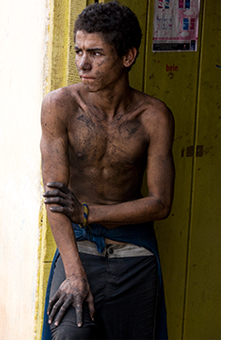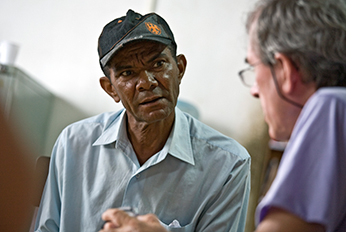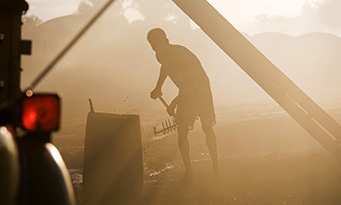Brazil
Slavery in Brazil
Debt Bondage
 Brazil is beset by the scourge of debt bondage—the landless are locked into lives of slavery. Poverty and limited job opportunities in rural areas allow slaveholders to prey on the desperate. Slave brokers called gatos, posing as legitimate labor recruiters, lure people with false promises into traveling far from home. Once they arrive, workers are saddled with “debts” for food, transportation, and tools to do the job—debts they can never realistically repay. By the time they realize it’s a cruel trick, they are already trapped. Workers are enslaved for farming, ranching, logging, and charcoal production. They have no clean water and little food, and suffer under deplorable conditions. The work is difficult and dangerous. Slaves toil in rural areas that are hard to access: remote cattle ranches located inland and carved out of virgin rainforest, crude camps where slaves burn logs into charcoal that is used to make steel, isolated soy and cotton farms, and lonely logging regions where slaves are forced to clear-cut large swaths out of the Amazon.
Brazil is beset by the scourge of debt bondage—the landless are locked into lives of slavery. Poverty and limited job opportunities in rural areas allow slaveholders to prey on the desperate. Slave brokers called gatos, posing as legitimate labor recruiters, lure people with false promises into traveling far from home. Once they arrive, workers are saddled with “debts” for food, transportation, and tools to do the job—debts they can never realistically repay. By the time they realize it’s a cruel trick, they are already trapped. Workers are enslaved for farming, ranching, logging, and charcoal production. They have no clean water and little food, and suffer under deplorable conditions. The work is difficult and dangerous. Slaves toil in rural areas that are hard to access: remote cattle ranches located inland and carved out of virgin rainforest, crude camps where slaves burn logs into charcoal that is used to make steel, isolated soy and cotton farms, and lonely logging regions where slaves are forced to clear-cut large swaths out of the Amazon.
Our Solutions in Brazil
 The Free the Slaves project in Brazil (2009-2016) had three key components. Educate Rural Workers Living in Vulnerable Communities About the Threat of Slave Labor. Brazil’s land tenure system puts productive farmland in the hands of a powerful elite. Those without access to farm their own land must send family members to distant work camps, where they are often trapped by debt bondage schemes. Our program educated families about the risks of migrating for work and what they can do if trapped in bondage. We also helped educate children about modern slavery so they can avoid the tricks that trap their parents. Advocate for the Inclusion of Slavery Survivors and Vulnerable Communities in Government-run Programs. Free the Slaves partners provided safe haven shelter for slaves who escape, submit complaints of slave labor to authorities, and triggered raids by Brazil’s mobile inspection teams, which are an elite strike force composed of labor inspectors, prosecutors, federal police and public officials. They rescue others still enslaved at work sites. We also advocated for rural economic development and social programs that make people less vulnerable and help prevent survivors from falling into slavery again. Advocate for the Enactment of New Anti-slavery Laws and Policies at the Federal, State, and Municipal Levels. Brazil has passed groundbreaking measures to punish slave holders—creating a “dirty list” of businesses and establishing a national pact that large corporations and business owners can sign to make a slavery-free pledge. Free the Slaves helped advocate for the enforcement of these measures and the passage of new initiatives to fight and prevent slavery. See our booklet, Catalyzing a Civil Society Movement Against Slavery, for details of the Free the Slaves Community Liberation Initiative strategy to create slavery-free and slavery-resistant communities worldwide. See a global Google Map of the communities where we work here.
The Free the Slaves project in Brazil (2009-2016) had three key components. Educate Rural Workers Living in Vulnerable Communities About the Threat of Slave Labor. Brazil’s land tenure system puts productive farmland in the hands of a powerful elite. Those without access to farm their own land must send family members to distant work camps, where they are often trapped by debt bondage schemes. Our program educated families about the risks of migrating for work and what they can do if trapped in bondage. We also helped educate children about modern slavery so they can avoid the tricks that trap their parents. Advocate for the Inclusion of Slavery Survivors and Vulnerable Communities in Government-run Programs. Free the Slaves partners provided safe haven shelter for slaves who escape, submit complaints of slave labor to authorities, and triggered raids by Brazil’s mobile inspection teams, which are an elite strike force composed of labor inspectors, prosecutors, federal police and public officials. They rescue others still enslaved at work sites. We also advocated for rural economic development and social programs that make people less vulnerable and help prevent survivors from falling into slavery again. Advocate for the Enactment of New Anti-slavery Laws and Policies at the Federal, State, and Municipal Levels. Brazil has passed groundbreaking measures to punish slave holders—creating a “dirty list” of businesses and establishing a national pact that large corporations and business owners can sign to make a slavery-free pledge. Free the Slaves helped advocate for the enforcement of these measures and the passage of new initiatives to fight and prevent slavery. See our booklet, Catalyzing a Civil Society Movement Against Slavery, for details of the Free the Slaves Community Liberation Initiative strategy to create slavery-free and slavery-resistant communities worldwide. See a global Google Map of the communities where we work here.
Our Partners in Brazil
Free the Slaves collaborated with:
- Comissão Pastoral da Terra (Pastoral Land Commission)
- Repórter Brasil
The Latest From Brazil
20 Years of Fighting for Freedom
The year 2020 brings several important anniversaries. It’s the 20th anniversary of the United Nations Palermo Protocol, the landmark treaty to confront modern forms of slavery worldwide. It’s the 20th anniversary of the Trafficking Victims Protection Act, the...
2017 Trafficking Report Released Amid Radical Budget Cutbacks
U.S. Secretary of State Rex Tillerson says the 2017 Trafficking in Persons Report illustrates “the commitment of our country that we have this joint effort underway across the entire United States government” to combat modern slavery. “Human trafficking is as old as...
Two Brothers Freed From Slavery and Pesticide Poisioning at Brazil Ranch
Their living and working conditions were dangerous and dreadful. Elias Vieira da Silva and Nerisvan da Silva Elias survived in a dilapidated shack, sleeping on hammocks and pelted by rain. They had no clean drinking water. There was no bathroom. They endured frequent...

